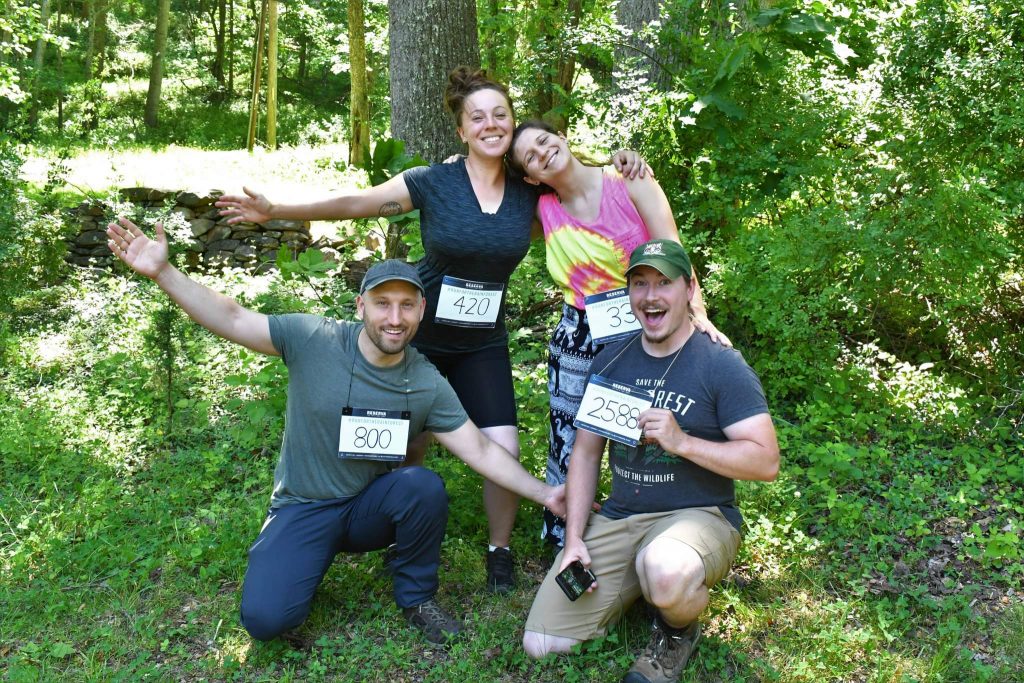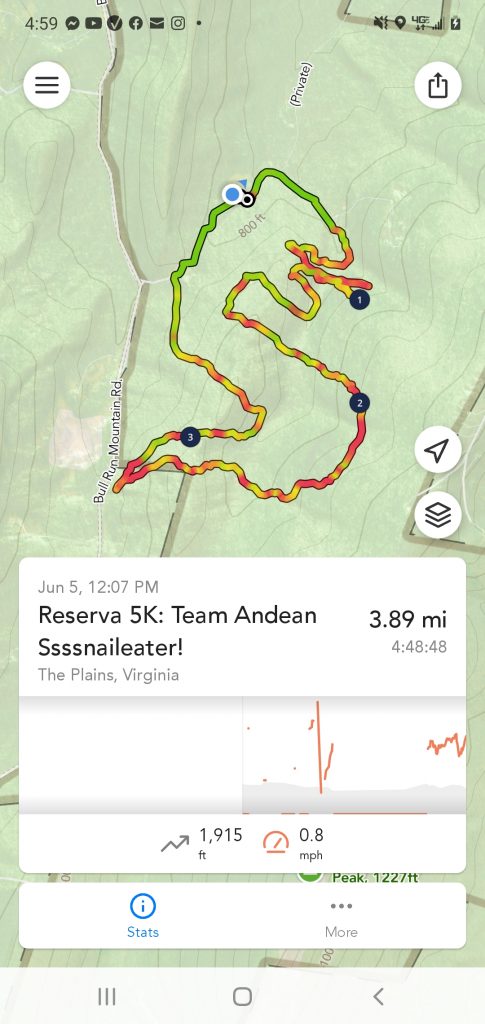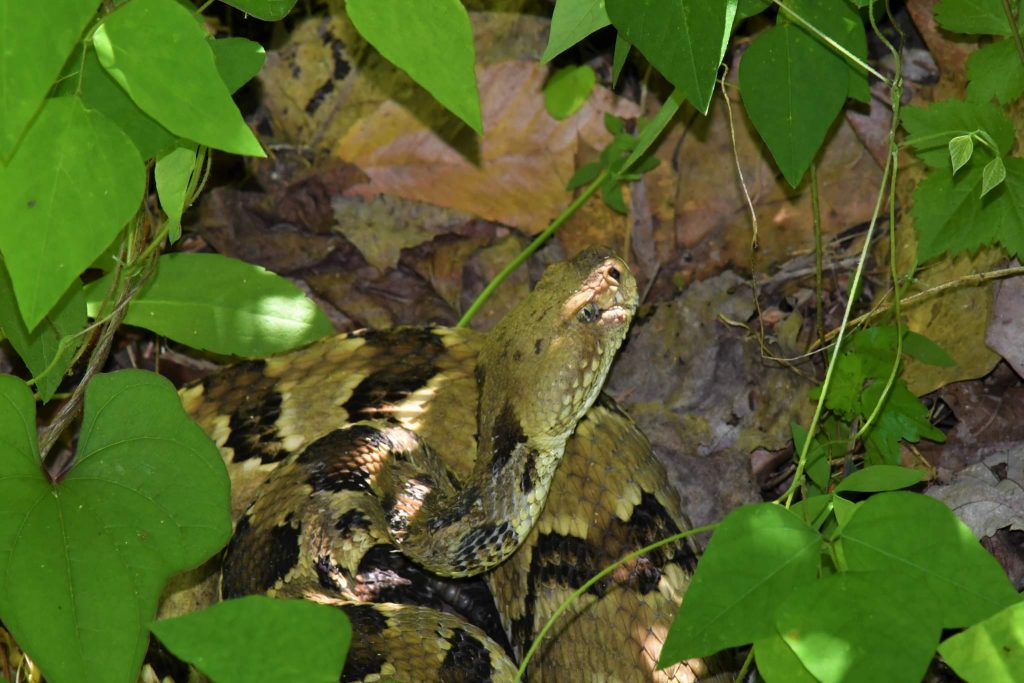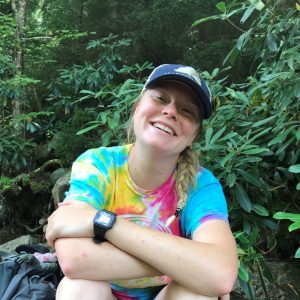As mentioned in a recent post our Preserve Manager, Joe Villari, got together a local team (VOF Research Associate, Michael Carr, Preserve Volunteer, Sarah Causey, and former VOF Special Projects Fellow, Kellen Hope) to participate in our friends and partners, Reserva: The Youth Land Trust’s 5k event!


In true Preserve style, they decided to turn the 5k into a 3.89 mile mini-bioblitz through the Preserve. Joe’s group (Team Andean Ssssnaileater) decided to complete a snake shaped route in honor of the Andean snaileater (Dipsas andiana) – an adorable and fascinating snake that is native to Reserva’s Ecuadorian cloud forest dominated reserve.
With an impressive “worldwide collective” of 716 runners, hikers, and walkers – @reservaylt was able to raise a total of $29,490.00 USD and preserve 1,769,400 square feet of forest!
So… what did Joe and his team encounter?
Believe it or not, their journey was officially blessed at the very start with an encounter with Bull Run Mountains very own native snake mascot, the timber rattlesnake!


In addition to that fitting and powerful start, Team Andean Ssssnaileater’s adventure lasted 4 hours, 48 minutes and 48 seconds. During this time, they traversed over 1,915ft of cumulative gain in elevation, with an average pace was 0.8mph (aka, a naturalist’s pace!) and encountered over 47 species of organisms (some have yet to have been identified)!
Next year VOF plans to partner with Reserva: Youth Land Trust and offer public Mini-Bioblitz style hikes around our 5k length green loop, where we will compare and contrast our native species with those found in the Ecuadorian cloud forest’s that Reserva: Youth Land Trust is working to protect!
So, please do stay tuned for your opportunity to #runfortherainforest next year, and in the meantime please visit their website below for more information about their amazing youth-based conservation work!
Species encountered during BioBlitz route:
Check the photo gallery below to see examples of some of Team Andean Ssssnaileater’s observations.
Animals:
Timber rattlesnake (Crotalus horridus)
Box turtle (Terrapene Carolina)
Pileated woodpecker (Dryocopus pileatus)
Worm eating warbler (Helmitheros vermivorum)
Wood thrush (Hylocichla mustelina)
Louisiana waterthrush (Parkesia motacilla)
Eastern phoebe (Sayornis phoebe)
Ruby-throated hummingbird (Archilochus colubris)
White-tailed deer (Odocoileus virginianus)
Fishing spider (Dolomedes sp.)
Wooly adelphid (Eriosoma lanigerum)
Luna moth (Actias luna)
Yellow-collared scape moth (Cisseps fulvicollis)
Golden-backed snipe fly (Chrysopilus thoracicus)
Cardinal jumping spider (Phidippus cardinalis)
A yet to be identified species of large, unusual fly (Order Diptera – collected to be further identified, studied, and recorded for our area)
Plants:
Skunk cabbage (Symplocarpus foetidus)
False hellebore (Veratrum viride)
Showy orchid (Galearis spectabilis)
Bloodroot (Sanguinaria canadensis)
Solomon’s seal (Polygonatum biflorum)
False solomon’s seal (Maianthemum racemosum)
Nodding lady’s tresses orchid (Spiranthes cernua)
Downy rattlesnake plaintain (Goodyera pubescens)
Striped wintergreen (Chimaphila maculate)
Violet wood sorrel (Oxalis violacea)
Upright yellow wood sorrel (Oxalis stricta)
Wild comfrey (Cynoglossum virginianum)
Blue-eyed star grass (Sisyrinchium angustifolium)
Roundleaf greenbriar (Smilax rotundifolia)
Blackberry (Rubus ursinus)
Maidenhair fern (Adiantum pedatum)
Broad beech fern (Phegopteris hexagonoptera)
Lady fern (Athyrium filix-femina)
Northern oak fern (Gymnocarpium dryopteris)
Cinnamon fern (Osmundastrum cinnamomeum)
Christmas fern (Polystichum acrostichoides)
American witch-hazel (Hamamelis virginiana)
Mountain laurel (Kalmia latifolia)
Red oak (Quercus rubra)
White oak (Quercus alba)
Tulip poplar (Liriodendron tulipifera)
Chestnut oak (Quercus prinus)
American beech (Fagus grandifolia)
American hornbeam, or muscle wood (Carpinus caroliniana)
Fungi:
Chicken of the woods (Laetiporus sulphureus)
White cup fungus (Peziza sp.)
